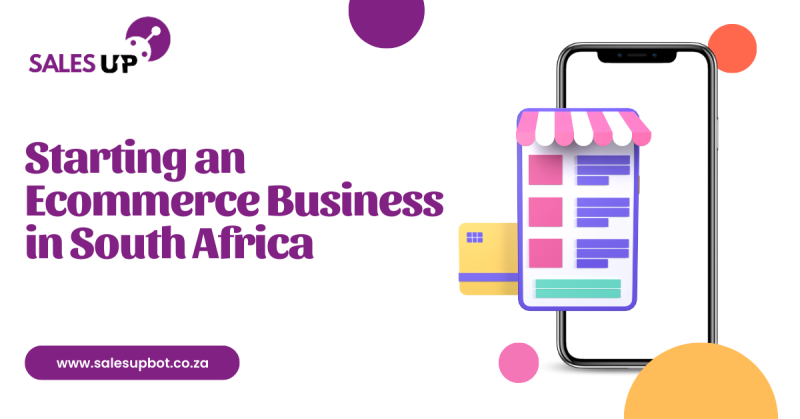Start Ecommerce Business

Ultimate Guide to Starting an Ecommerce Business in South Africa
Launch, Build, and Grow a Profitable Online Store in 2023
Commencing an Ecommerce venture in South Africa offers a promising avenue to earn profits online, boost the sales volume of your current physical store, or serve as a launching pad for expanding your digital retail dominion.
Establishing an Ecommerce enterprise demands a substantial amount of effort and perseverance. The process involves several essential steps that must be taken to launch your virtual store successfully. This can often seem intimidating as determining the necessary tools and integrating them seamlessly can be a challenging task.
This guide will simplify the process of initiating an Ecommerce enterprise by furnishing a detailed breakdown of the necessary steps to follow. Additionally, it will provide a comprehensive list of the required tools and outline how they integrate cohesively to facilitate the smooth operation of your virtual store.
Whether you possess a pre-existing business or aspire to retail your products virtually, or if you've identified a product that you believe is ideal for online sales. In this blog you will learn how to start an ecommerce business in South Africa.
A quick chat about Dropshipping:
Dropshipping is a type of Ecommerce business model where you are not responsible for owning, storing, or managing any physical products. Instead, you entrust a third-party supplier who possesses the inventory and dispatches the product once an order is placed on your virtual store. This allows you to concentrate on marketing your store and providing customer support.
Although dropshipping can serve as an economical means of gauging a product's market demand, we advise against relying solely on this model to establish an Ecommerce enterprise. The majority of dropshipping businesses operate from China, which results in extended delivery times to South Africa. Moreover, profit margins are minimal, and outsourcing the fulfillment and delivery process, a vital component of customer satisfaction, can be problematic.
Concentrating on a specific product niche and purchasing inventory represents a far superior tactic for developing a stable Ecommerce enterprise in South Africa. By commencing with a narrow focus, you can establish yourself as the preeminent specialist in your product category. This will empower you to provide thorough responses to any inquiries that customers may have regarding your products. Your product knowledge will also bolster your brand's reputation and stimulate customer loyalty, ensuring that they return when they require the merchandise you offer.
Selling on Ecommerce Platforms vs Marketplaces:
Every day, millions of individuals access the internet with the intention of purchasing products.
To retail products online, you require a virtual store. In the physical realm, you have two options for vending products: establish a store on a high street, where you are accountable for all aspects of store management, such as paying rent, devising advertising campaigns to draw customers, offering staff and tools to facilitate transactions, and accepting payments.
Alternatively, you can establish a concession in a department store, where you are accountable for the goods you sell, while the property maintenance, advertising campaigns to attract customers, and checkout procedures are managed by the department store owner.
To accomplish this, there are two options: launching your own eCommerce store or retailing your products on a Marketplace platform.
When it comes to choosing an ecommerce store platform, there is an extensive range of options, each with distinct selling points. We have streamlined this vast selection to a few platforms that offer a comprehensive range of features, are popular and suitable for the South African market.
Ecommerce platforms can be divided into two categories:
- Hosted
- self-hosted
Hosted:
Hosted ecommerce software provides a pre-configured solution that can be set up without requiring technical skills. For most online store owners, a hosted ecommerce platform is the best option. While these platforms may not be customizable to the same extent as self-hosted solutions, they still offer a range of features and can be extended through add-on apps. Hosted solutions are typically more expensive and charged on a monthly basis, but they save you time on debugging server errors and allow you to concentrate on marketing your store to potential customers and encouraging them to buy your products.
Self-hosted:
When using self-hosted ecommerce software, it is your responsibility to install the software on a server, manage the server, and address any issues that may arise. Self-hosted solutions come with benefits, including lower overall costs compared to hosted solutions, and the fact that the software is often Open Source, which provides greater flexibility for customizing your shopping cart software. However, server management can be a challenge, and you may find yourself spending a significant amount of time tweaking settings and troubleshooting errors instead of focusing on growing your business.
Hosted Ecommerce Platforms:
Shopify:
Shopify is the go-to choice for online store owners, catering to businesses of all sizes, from small, niche e-commerce sites to billion-dollar companies like Allbirds. It offers all the necessary features to launch an online store in South Africa out of the box. Shopify provides an App Store and a Theme Store, which enables you to customize your online store to your specific needs. The platform's pricing starts at $29 per month, making it an affordable option to set up your online store quickly. However, keep in mind that additional app fees can accumulate quickly as you grow and customize your store.
Self-Hosted Ecommerce Platforms:
- Woo-Commerce:
Woo-Commerce is a highly popular ecommerce platform that can turn a WordPress blog into a fully-functional online store. This free plugin offers an extensive selection of both free and paid extensions that can be easily installed through WordPress. As an open source project, Woo-Commerce provides the flexibility to customize and adapt the ecommerce platform to your business needs. While it may not have the same sleek design and user-friendly interface as Shopify, Woo-Commerce is an affordable way to test the demand for your products. You can install the software on your own server and start selling within an hour or two. Alternatively, hosting companies like Bluehost offer Woo-Commerce hosting with prices starting at less than R60 per month, and no transaction fees. With such providers, the entire process of installing and managing the platform is automated, removing the technical burden that comes with open-source software installation and server management.
- Magento:
Magento is a robust open-source ecommerce platform that is best suited for established retailers or large ecommerce websites. It has a high degree of extensibility and power, but with that comes a steep learning curve, and it usually requires a full-time PHP developer to install and customize. The platform can create amazing user experiences and can be customized to suit unique business processes. However, it requires a lot of configuration prior to launch and needs optimized servers to run the ecommerce software effectively. Magento is recommended for businesses who are willing to invest the time and resources required to deploy this powerful ecommerce platform. You can install Magento on your own server or use hosting companies like Site round or Nexcess that offer entry-level packages for learning and production-ready solutions respectively.
Order Fulfillment and Shipping:
It is essential to provide a satisfying fulfilment and delivery experience to customers even after they have completed their purchase on your ecommerce store. The process of moving physical goods from your warehouse to a customer's location can be challenging and can lead to several problems. To ensure customer satisfaction, it is crucial to maintain transparency and keep them informed at every step of the delivery process. To begin with, displaying the lead time, available delivery methods, and estimated delivery time will help build customer trust and manage their expectations even before they complete the purchase.
Delivery Services:
In South Africa, ecommerce businesses have access to a wide range of delivery options, which are usually priced based on three main factors: the weight of the item being shipped (measured either by its actual weight or its volumetric weight, whichever is greater), the destination of the package, and the desired speed of delivery. Volumetric weight is calculated based on the amount of physical space a package occupies during transport. The greater the amount of space a package takes up, the higher the delivery charges will be. To determine the volumetric weight of a package, courier companies use a specific formula:
volumetric weight = length x width x height (cm) / 5000
When it comes to ecommerce delivery services in South Africa, the cost is usually determined by three factors: the weight or volumetric weight of the item, the delivery destination, and the preferred delivery speed. Delivering to rural or outlying areas often incurs additional charges, which can be quite costly. In such cases, it may be worthwhile to charge customers living in these areas an extra amount to cover the additional delivery costs. While fast delivery times are ideal for customers, they may not be cost-effective for your ecommerce business. Offering customers the option to pay extra for overnight shipping during checkout can help improve your conversion rate among those who need their products quickly. Standard delivery times in South Africa usually take 2-3 working days, while overnight delivery typically costs over R100 for 2kgs.
South Africa Post Office:
In South Africa, using the Post Office to ship orders is the most economical option as rates are solely determined by weight and not by the destination of the parcel. This means that sending a 1kg parcel to any location in South Africa will cost the same. However, due to the Post Office's poor track record, it is not a recommended option. Their services are limited to counter to counter, and collection notifications are often not received, while their online tracking system is either faulty or does not accurately reflect the status of the shipment.
Courier Services:
Door to door courier services are the preferred option for most ecommerce deliveries in South Africa. The courier service you choose can have a significant impact on your customers' perception of your brand. Late deliveries or other delivery issues can result in negative feedback and damage your business's reputation. With so many courier companies available, it's important to choose the one that meets your ecommerce business's specific needs. Cost should not be the sole factor when selecting a courier service. You should consider their service offerings, responsiveness, and communication channels in case of any problems. Some of the most popular courier companies in South Africa include (in no particular order).
- Dawn WinG
- Aramex
- Fastway
- MDS Collivery
- Courier IT

